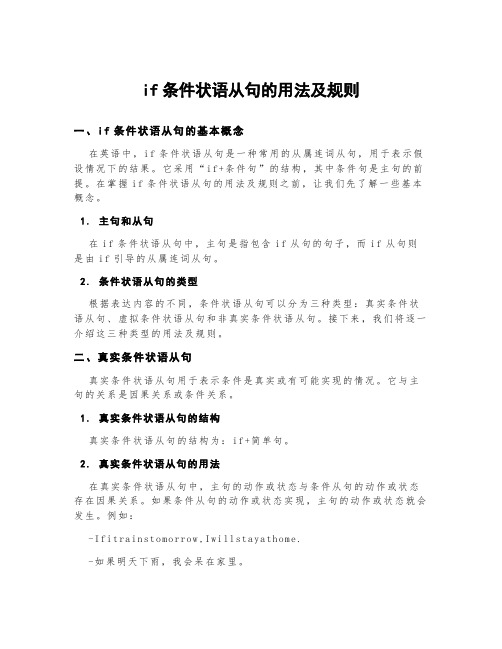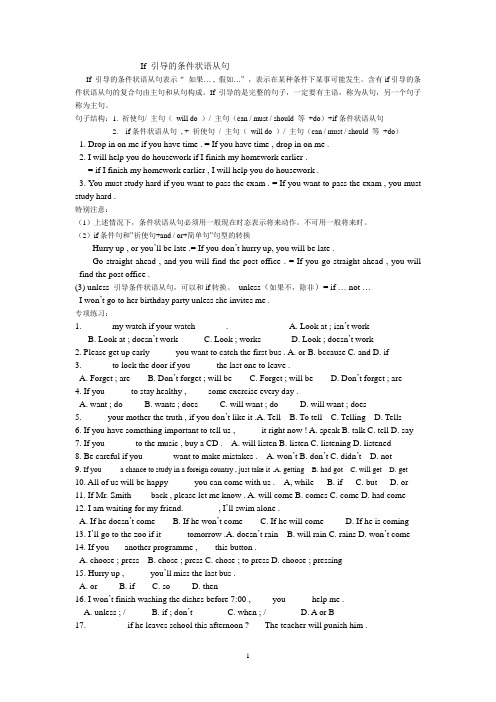If 条件状语从句
if条件状语从句的用法及规则

if条件状语从句的用法及规则一、i f条件状语从句的基本概念在英语中,i f条件状语从句是一种常用的从属连词从句,用于表示假设情况下的结果。
它采用“i f+条件句”的结构,其中条件句是主句的前提。
在掌握i f条件状语从句的用法及规则之前,让我们先了解一些基本概念。
1.主句和从句在i f条件状语从句中,主句是指包含if从句的句子,而i f从句则是由if引导的从属连词从句。
2.条件状语从句的类型根据表达内容的不同,条件状语从句可以分为三种类型:真实条件状语从句、虚拟条件状语从句和非真实条件状语从句。
接下来,我们将逐一介绍这三种类型的用法及规则。
二、真实条件状语从句真实条件状语从句用于表示条件是真实或有可能实现的情况。
它与主句的关系是因果关系或条件关系。
1.真实条件状语从句的结构真实条件状语从句的结构为:if+简单句。
2.真实条件状语从句的用法在真实条件状语从句中,主句的动作或状态与条件从句的动作或状态存在因果关系。
如果条件从句的动作或状态实现,主句的动作或状态就会发生。
例如:-I fi tr ai ns to mo rro w,I wi ll st ay at hom e.-如果明天下雨,我会呆在家里。
上述例句中,条件从句“if it ra in st omo r ro w”表达的是“下雨”的情况,主句“Iw il ls t ay at ho me”表示的是因果关系,即如果明天下雨,我将呆在家里。
三、虚拟条件状语从句虚拟条件状语从句用于表示条件是不真实、不可能实现或对现实进行推测的情况。
1.虚拟条件状语从句的结构虚拟条件状语从句的结构为:if+过去完成时。
2.虚拟条件状语从句的用法在虚拟条件状语从句中,条件从句的动作或状态无法实现,主句的动作或状态也会受到影响。
例如:-I fI ha ds tu di ed har d er,I wo ul dh av epa s se dt he ex am.-如果我学得更努力,我就能通过考试了。
if 引导的条件状语从句

一般现在时。 If you drive too fast, you may have an accident. You must stop if the traffic is red. If you finish the homework, you can go home. 如果你作业做完了就可以回家了。 If you want to lose weight you must/should eat less bread. 如果你想减肥,你必须少吃面包。
if引导的条件状语从句
If条件句:条件句用于陈述语气,表示将来的可能性,能力, 允
诺,命令,要求,请求,建议时,假设的情况可能发生,其中 if 是“假如, 如果”的意思。主句一般将来时 ,从句用一般现在时。
运用“主将从现”的原则。
构 成
条件从句
主句
时 态
If+一般现在时 主语+shall/will+动词原形
if引导的条件状语从句
主从句的时态?
If I get up late, I will be late for school. If I don’t finish my homework, I won’t go to bed. If you join the band(乐队), you will be famous.
• 除非天气不好,我每天早晨都要去散步。
• 3. I won‘t loan you unless you are in extreme need of money.
• 若不是你急需用钱,我不会借钱给你的。
if引导的条件状语从句
Summary(小结)
if 条件句不一般, 几个要点记心间; 条件句,放在前, 逗号要放句中间。 条件句表可能, 主将从现不一般; 条件句表事实, 主句常用现在时。
If引导的条件状语从句

→主句谓语中也可以用had better(not)do,提建议 例句:如果你想减肥,你最好锻炼。
eg:If you want to lose weight,you had better take some
2021/6/20
3
exercise.
if的反义词:if...not...=unless,意思是:“如果不,除非”
W--i-t-h--y--o-u--r--h--e-l-p-, I’ll finish my job soon. 如果你帮我,我将很快完成我的工作。 If there is no water, fish may die.
Fish may die w--i-th--o--u-t--w--a--t-e-r--. 如果没有水,鱼可能会死。
I won’t go there unless பைடு நூலகம் hear from you.(同义句 if ) don’t
I won’t go there _____ I _____hear from you. I won’t go to the party if I am not invited. (同义句)
I will go out tomorrow if it doesn’t rain. = If it doesn’t rain, I will go out tomorrow.
If 引导的宾语从句放在主句之后;而if引 导的状语从句可放在主句之前也可放在主 句之后
If 引导的条件状语从句放于句首时多用逗号隔开;
时态:
if引导的条件状语从句, 主句用一般将来时(will),从句用一般现在时。
→主句谓语中也可以含有情态动词, 如:must,can,could,should等
if 条件状语从句

If 引导的条件状语从句If 引导的条件状语从句表示“如果… , 假如…”,表示在某种条件下某事可能发生。
含有if引导的条件状语从句的复合句由主句和从句构成。
If引导的是完整的句子,一定要有主语,称为从句,另一个句子称为主句。
句子结构:1. 祈使句/ 主句(will do )/ 主句(can / must / should 等+do)+if条件状语从句2. if条件状语从句, + 祈使句/ 主句(will do )/ 主句(can / must / should 等+do)1. Drop in on me if you have time . = If you have time , drop in on me .2. I will help you do housework if I finish my homework earlier .= if I finish my homework earlier , I will help you do housework .3. Y ou must study hard if you want to pass the exam . = If you want to pass the exam , you must study hard .特别注意:(1)上述情况下,条件状语从句必须用一般现在时态表示将来动作。
不可用一般将来时。
(2)if条件句和”祈使句+and / or+简单句”句型的转换Hurry up , or you’ll be late .= If you don’t hurry up, you will be late .Go straight ahead , and you will find the post office . = If you go straight ahead , you will find the post office .(3) unless 引导条件状语从句,可以和if转换。
If引导的条件状语从句

--We’ll go to the library tomorrow if it __D_.
A. isn’t rain B. rain C. won’t rain D.will you do if you _____Ato the old folk’s
home visit?
2. I ____ her the answer if she ____me. A.can Dtell, will ask B. will tell, will ask C. would tell, ask D. will tell, asks
3. – What are you going to do tomorrow?
If 引导条件状语从句的时态为一般现在时
记住“主将从现”
7
----Sam, do you know if Alice ____to my party next week?
----I think she will come if she ____ free.
A comes; is B will come; will be C will come; is D comes; will be
If 引导的宾语从句放在主句之后;而if引 导的状语从句可放在主句之前也可放在主 句之后
5
1. Can you tell me if she can come to the meeting ?
2. She will not go there if it is rainy tomorrow.
3. I can’t guess if she will be angry . 4. If we help each other , we both will get
if引导的条件状语从句

if引导的条件状语从句if条件句:条件句用于陈述语气,表示假设的情况可能发生,其中if 是“如果”的意思。
用法例句①主句为一般将来时态,if从句用一般现在时态(即主将从现)。
We will stay at home if it rains tomorrow.如果明天下雨,我将要呆在家。
②主句中含有情态动词,if从句用一般现在时态。
If you finish your homework, you can go home now. 如果你做完了作业,你现在可以回家了。
③主句为祈使句,if从句用一般现在时态。
Don’t jump into the river if you feel very hot. 如果你感到很热,不要跳入河里。
④主句为过去将来时,if从句用一般过去时态(如果涉及到be动词,一律都用were)。
此时,表达的是和现实相反的推测,用虚拟语气。
If I were you, I wouldn’t do it like that.如果我是你,我就不会那么做的。
If you gave me some money, I would be very happy. 如果你给我一些钱,我就会很高兴的。
构成条件从句主句时态If+一般现在时主语+shall/will+动词原形例句If he comes, he will take us to the zoo.1) 用法:(1)条件状语从句通常由连词if引导,意为“如果、假如”,主句不能用be going to表示将来,而应该用shall,will。
If you leave now, you are never going to regret it. (错误)If you leave now, you will never regret it. (正确)(2)if “如果”,引导条件状语从句,主句用一般将来时,从句则用一般现在时,如:If it rains tomorrow, I shan’t climb the hills.(3)另外,主句是祈使句或含有情态动词,从句也用一般现在时。
if 引导条件状语从句

if 引导条件状语从句【最新版】目录1.条件状语从句的定义和作用2.if 引导条件状语从句的用法3.实例分析4.注意事项正文一、条件状语从句的定义和作用条件状语从句是表示某种条件成立时,主句所表达的内容才会实现的从句。
它通常由连词 if 引导,用来表示在某种条件下,主句所述情况是否成立。
条件状语从句在英语中十分常见,具有很强的实用性。
二、if 引导条件状语从句的用法if 引导条件状语从句时,主句通常使用一般将来时,而从句则使用一般现在时。
这种时态搭配是为了表示在某种条件下,将来会发生的事情。
当然,在某些特殊情况下,也可以使用其他时态,例如主句使用一般现在时,从句使用一般将来时。
三、实例分析1.如果明天不下雨,我们会去公园。
(If it doesn"t rain tomorrow, we will go to the park.)在这个例子中,从句“it doesn"t rain tomorrow”表示一种条件,即明天不下雨,主句“we will go to the park”表示在这种条件下会发生的事情,即我们去公园。
2.如果你愿意,我们可以一起去看电影。
(If you are willing, we cango to the movies together.)在这个例子中,从句“you are willing”表示一种条件,即你愿意,主句“we can go to the movies together”表示在这种条件下会发生的事情,即我们一起去看电影。
四、注意事项在使用 if 引导条件状语从句时,需要注意以下几点:1.条件状语从句中的 if 通常可以翻译为“如果”,但有时也可以翻译为“是否”或“是不是”,具体翻译需要根据上下文判断。
2.条件状语从句中的时态搭配要正确,通常为主句一般将来时,从句一般现在时。
3.条件状语从句有时可以省略 if,直接用主句和从句连接,例如:It will be fine if it doesn"t rain.(如果下雨,天气就不会好了。
If引导的条件状语从句

1.If you __C___ to the party, you’ll have a great time.
A. will go B. went C. go D. going 2. I __D__ her the answer if she ____me.
A.can tell, will ask B. will tell, will ask C. would tell, ask D. will tell, asks
11. If you ___a_re_____(be) happy , we will be happy .
12. If she translates (translate ) the sentence word by word , she __w_il_l _g_e_t_(get ) its true meaning .
2 If I ___c_o_p_y____(copy ) your homework , I will cheat myself .
3 If she ___d_o_e_s_n_’t_g_e_t____(not get ) up early , she’ll miss the early bus .
4 If your mother___b_u_ys__ (buy) the book for you , it will be good for your study.
• 例如: If you have any questions to ask, please come to my office. 如果你有问题要问的 话,请到我办公室来。
1. if 在句中的含义不同 I want to know if he is a teacher.
- 1、下载文档前请自行甄别文档内容的完整性,平台不提供额外的编辑、内容补充、找答案等附加服务。
- 2、"仅部分预览"的文档,不可在线预览部分如存在完整性等问题,可反馈申请退款(可完整预览的文档不适用该条件!)。
- 3、如文档侵犯您的权益,请联系客服反馈,我们会尽快为您处理(人工客服工作时间:9:00-18:30)。
If you go to the party, you will have a great time!
If I don’t finish my homework, my teacher will be angry. If I eat too much ice cream, I will have a stomachache.
will I, tell her about it
If she calls me, I will tell her about it.
When do you usually get up on weekdays?
What will happen if you get up at 9:00 on weekdays? If I get up at 9:00, I will be late.
If If If If
you you you you
don’t finish your homework,… eat too much ice cream ,… watch TV too much,… can be a teacher one day,…
If you use the mobile phone in class, … If you argue with your best friends, …
龙川县培英学校 胡文红 2011.5.27
if you're happy and you know it clap your hands if you're happy and you know it clap your hand if you're happy and you know it never be afraid to show it if you're happy and you know it clap your hands if you're happy and you know it stomp your feet if you're happy and you know it stomp your feet if you're happy and you know it never be afraid to show it if you're happy and you know it stomp your feet if you're happy and you know it shout “Oh yeah!” if you're happy and you know it shout “Oh yeah!” if you're happy and you know it never be afraid to show it if you're happy and you know it shout “Oh yeah!”
例句6 We will go out if it is fine tomorrow.
如果明天天气好,我们就出去。
例句7 I don’t know if he will come tomorrow.
我不知道明天他是否会来。
you, work hard, your dream, come true
If you work hard, your dream will come true.
if 引导的条件状语从句
(一)if 所引导的条件状语从句, 既可位于主句前,也可以位于主句 后。位于主句前时,须用逗号与主 句隔开;如果位于主句后,中间不 必用逗号。
例句1 如果他回来了,请告诉我。
If he comes back, please tell me. =Please tell me if he comes back.
if 引导的条件状语从句 时态--主将从现
(二)主句用一般将来时态,从句用一 般现在时态表将来.
例句 2 如果你努力学习,你的梦想将会实现.
If you study hard, your dream will come true.
例句3 如果明天下雨,我将不出去散步.
If it rains tomorrow, I won’t go out for a walk.
he, study hard, he, get good grades
If he studies hard, he will get good grades.
it, be sunny, she, fly a kite
If it is sunny, she will fly a kite.
if she, call me,
What will you do if you go to the party?
If I go to the party, I will...
Pair work: Choose one or two situations
to make dialogues with your partner.
What will happen if you …?
Example
A: What will happen if you don’t finish your homework?
B: If I don’ finish my homework, my I am happy, I will talk with my best friends. If I have a lot of money, I will travel around the world.
(三)主句是祈使句或含有 may, must, can等情态动 词的句子时,从句也用一般 现在时。如: 例句4 Please call me if he comes next Sunday. 例句5 You must hurry if you want to go with me.
(四)注意条件状语从句中的if与宾语 从句中的if的区别。if引导条件状语从 句时意为“如果”,引导宾语从句则意 为“是否”,相当于 whether,从句时 态需根据语境确定。请比较:
